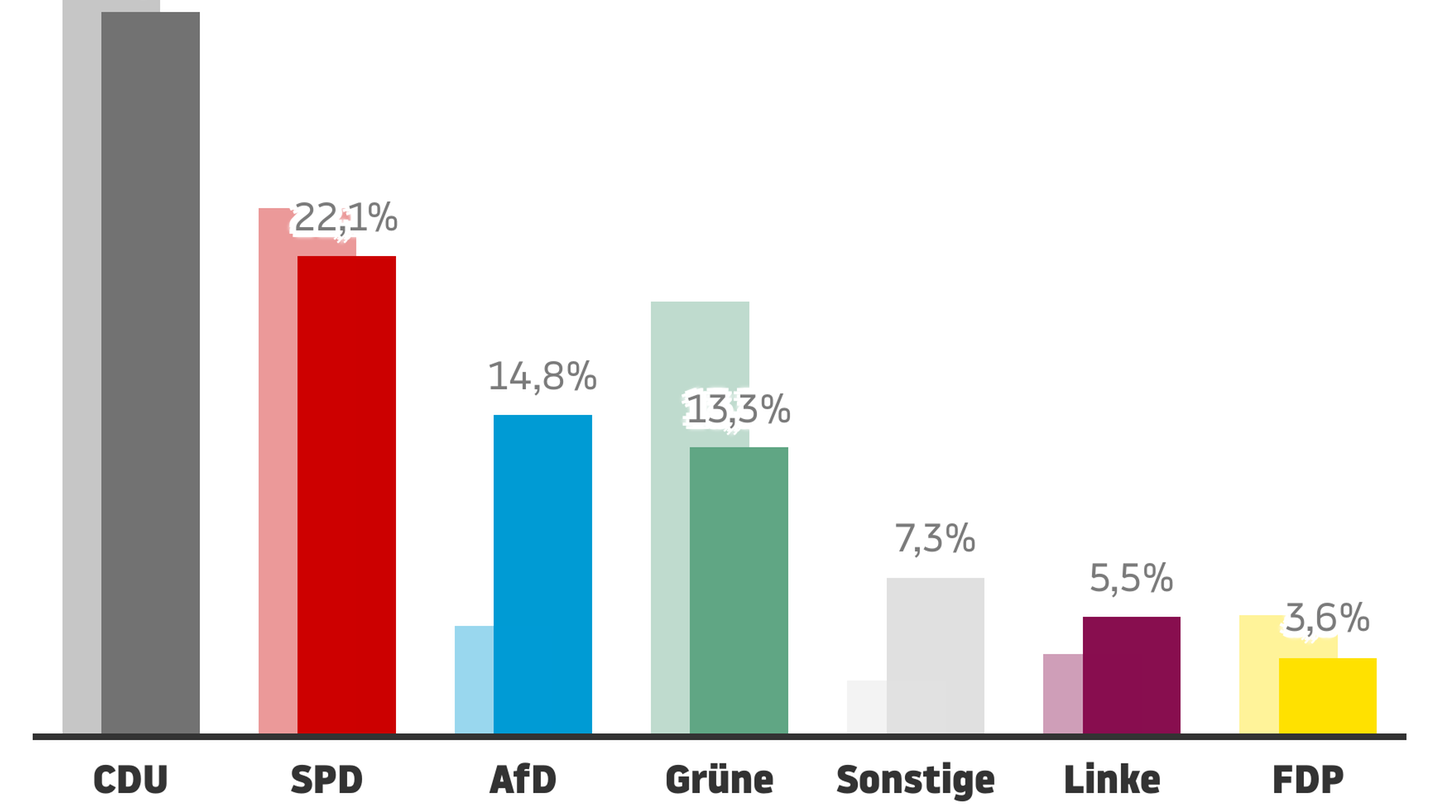Local elections in NRW
Latest projections: CDU in front, AfD places in, green falls off
Copy the current link
Add to the memorial list
The CDU is at the front in the local elections in North Rhine-Westphalia and the AfD is almost reducing its result. In many major cities, the position of the mayors are due to the posts of the mayors.
Note: This article is continuously updated.
The CDU clearly remains the strongest force in the local elections in North Rhine-Westphalia. The AfD, which could almost triple its result, is also one of the winners in the most populous federal state. In this way, she ended up in third place behind the SPD in the nationwide election. The Greens had to accept considerable losses.
The coordination in North Rhine-Westphalia was the first political mood test for the black-red federal government under Chancellor Friedrich Merz (CDU) after the early Bundestag election in February.
The strengthening of the AfD in the west triggered worries with the other parties. “This result has to give us thinking, it cannot let us sleep calmly,” said NRW Prime Minister Hendrik Wüst (CDU). “Even my party not that clearly won this choice.”
The graphic below shows continuously updates the results of the Projections:
At this point, our editorial team has integrated content from Datawrapper GmbH.
Due to their data protection settings, this content was not invited to protect their privacy.
AfD now the third strongest force in North Rhine-Westphalia
According to a extrapolation for the local elections at 9:45 p.m. in the WDR, the CDU has 33.3 percent nationwide. The Christian Democrats performed one percentage point worse than in the 2020 local elections (34.3 percent).
The SPD follows in second place with 22.1 percent and a minus of 2.2 percentage points compared to 2020. The AfD is strong on the upper, which increased by 9.7 points to 14.8 percent and thus pushed itself in third place in front of the Greens. These suffered significant losses of 6.7 percentage points and landed at 13.3 percent. The AfD in North Rhine -Westphalia had already overtaken the Greens in the Bundestag election in February.
The FDP dropped to 3.6 percent and lost 2 percentage points. The left improved by 1.8 points to 5.6 percent.
According to a current extrapolation in the evening, the turnout was 56.5 percent higher than in the 2020 municipal election (51.9 percent).
Stab in many NRW cities
In addition to the local parliaments, mayors, mayors and district councilors were also elected. Many major cities such as Aachen, Bonn, Bochum, Bielefeld, Düsseldorf, Dortmund, Duisburg, Cologne and Münster are heading for stitch elections around the mayor position on September 28th.
In the largest NRW city of Cologne there is a runoff election between the Green State Vice President Berivan Aymaz and the SPD man Torsten Burmester. In the state capital of Düsseldorf, incumbent Stephan Keller (CDU) was ahead, but has to go to the runoff election against Clara Gerlach (Greens).
In Bonn, the Green Mayor Katja Dörner has to face a runoff election against the CDU candidate Guido Déus, who was ahead in the first ballot.
In three cities, AfD candidates made it into the runoff election. In Gelsenkirchen and Duisburg, the voters will decide between the SPD and AfD applicants in two weeks. In Hagen, the AfD candidate competes against a CDU politician.
In Hamm and Herne, the SPD office holders prevailed in the first ballot. In Bielefeld, Oberhausen, Bottrop and Mönchengladbach there will be stab elections between the SPD and CDU candidates in two weeks. Two CDU women were able to prevail in the district elections: Ina Laukötter won the district of Gütersloh and Bettina Warnecke in the district of Mettmann.
AfD is self -confident
AfD state chief Martin Vincentz said: “The first counts clearly show it: NRW wants less” keep it up “and more AfD-much more!” The local elections are more than a pure coordination of the mayor, city councilors and district councils. “It was a referendum on the direction of our country. And whoever ignores the will of the voters will be punished by the voters.” The AfD has an increasingly clear proportion of real regular voters.
The Gelsenkirchen AfD member of the state parliament Enxhi Seli-Zacharias said in the WDR: “We cemented our electorate. It is no longer a pure frustration or a tactical choice.”
NRW head of government Wüst was concerned. The fact that the AfD had roughly tripled its result compared to the past local elections, present all democratic parties with challenges. Everyone would have to ask themselves: “What are the right answers in terms of poverty migration? Are all parts of our social systems really fair? What about problematic real estate?”
SPD: have to get out of deep
The SPD chairman Bärbel Bas and Lars Klingbeil reacted disappointed. “It is true that we couldn’t stop the downward trend,” said Duisburg -based Bas in the WDR. Nevertheless, the values are not a disaster, as your party was previously predicted. “Of course we have to ask ourselves how we can get out of this low,” said Bas. The good result of the AfD must take care of all democratic parties.
The co-chair and Vice Chancellor Klingbeil told the German Press Agency that the economic situation had driven the voters the most. “We will not let up when it comes to economic growth and safe jobs. That has priority for us.”
The SPD state chairman Achim Post said: “The NRW SPD understood.” There should now be no “further” with the NRW SPD. Politics had to take place in such a way that people understand them: “That we discuss, decide and implement that we do not get bogged down in any secondary debate”.
A lot of federal prominence in the election campaign in NRW
Chancellor Merz, Vice Chancellor Klingbeil, Federal Minister of Labor BAS and other top representatives of the federal parties performed several times in the election campaign in NRW, which underlined the federal political importance of the local elections. For Merz and BAS as well as other federal politicians such as Bundestag parliamentary group leader Jens Spahn and CDU general secretary Carsten Linnemann, NRW is the home state.
According to Union parliamentary group leader Jens Spahn, the outcome of the local elections with the victory of the CDU gives the black and red coalition in the BUND tailwind. The result is an incentive for calm pragmatic work. At the same time, Spahn warned: “The increase in the extreme right must be a wake -up call for us: poverty migration, social abuse and too often failed integration must not be taboo.”
Disappointment with the Greens
The NRW green also reacted disappointed in view of the crash of their party. “In the past local elections, they have a headwind, at the moment they often have headwinds,” said the Greens state chairman Yazgülü Zeybek and Tim Achtermeyer. In 2020, the Greens had achieved their best result in a local election with 20 percent. Greens Central Center Felix Banaszak sees the weak performance in the local elections as a result of a fundamental political shift. “Ecological, progressive politics has a hard time,” he said.
SPD further strongest force in the Council of Gelsenkirchen
In the city council of Gelsenkirchen, the SPD was again able to assert itself as the strongest parliamentary group just before the AfD. The long-standing SPD stronghold of Gelsenkirchen was under special observation in the local election after the AfD had reached a majority in the second votes in the Bundestag election.
Almost 14 million voters entitled to vote
Around 13.7 million citizens were invited to the local elections in the most populous state. Since 1999, the CDU has regularly brought most votes nationwide in local elections in NRW.
Dpa
YKS, lib
Source: Stern
I have been working in the news industry for over 6 years, first as a reporter and now as an editor. I have covered politics extensively, and my work has appeared in major newspapers and online news outlets around the world. In addition to my writing, I also contribute regularly to 24 Hours World.




